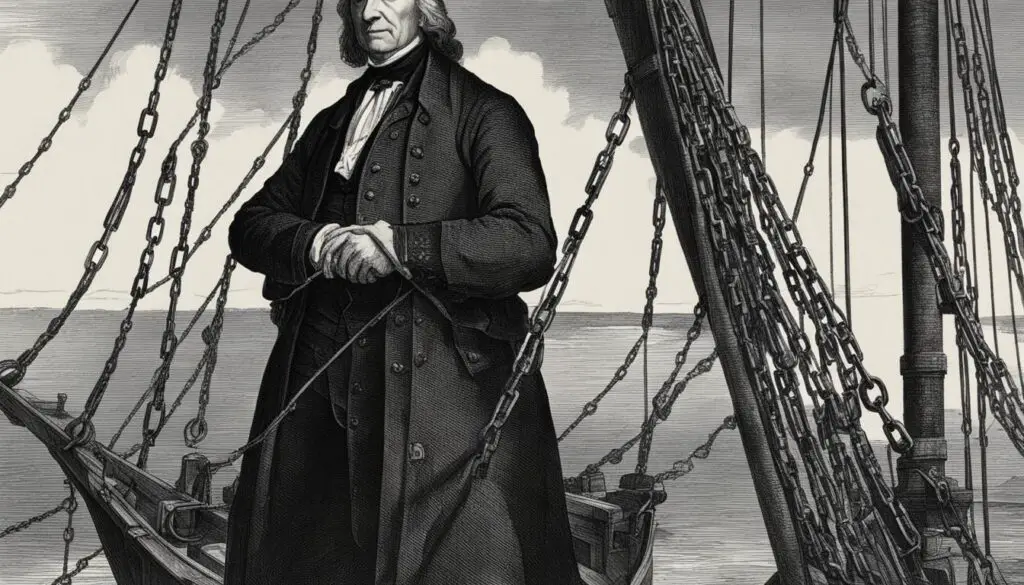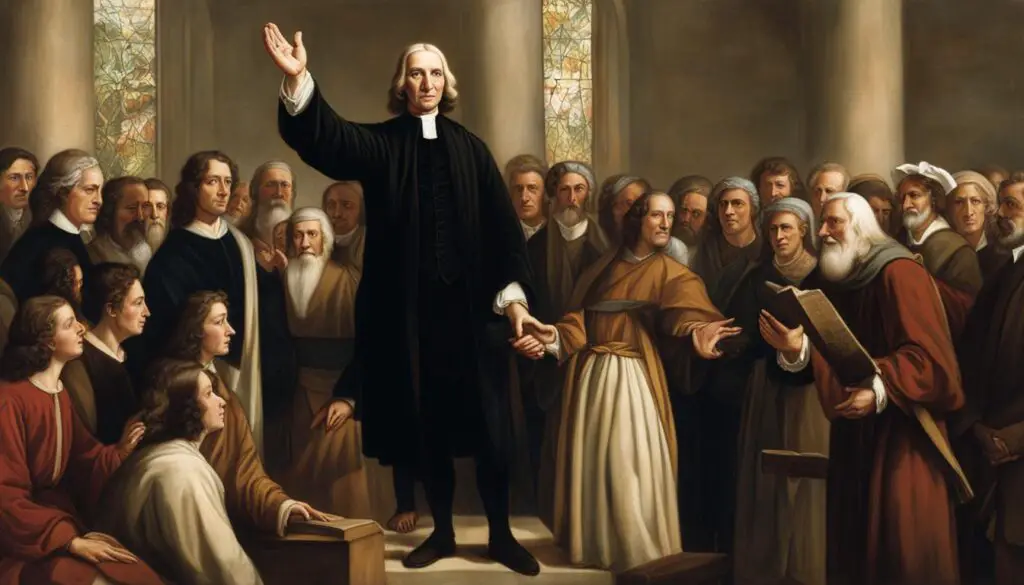John Wesley, the founder of Methodism, was a religious leader and clergyman who inspired a movement for social justice and Christian revival. His theology and teachings emphasized justice, mercy, truth, and love for God and fellow human beings. Wesley’s opposition to slavery and his pursuit of justice were rooted in his understanding of God’s love and moral character. He sought to reform society by spreading scriptural holiness and promoting justice in all areas of life.
Key Takeaways:
- John Wesley founded Methodism and played a significant role in inspiring a movement for social justice and Christian revival.
- Wesley’s theology emphasized justice, mercy, truth, and love for God and neighbor.
- He was one of the first church leaders to oppose slavery as an institution, not just specific practices.
- Wesley’s teachings continue to inspire individuals and communities to advocate for justice and compassion.
- His legacy reminds us of the inseparable connection between faith and social action in pursuing a more just and compassionate world.
John Wesley’s Opposition to Slavery
John Wesley, a dedicated religious leader and the founder of Methodism, was renowned for his unwavering opposition to the institution of slavery. Unlike many of his contemporaries who only opposed the slave trade or specific cruel practices, Wesley took a brave stand against the entire system of slavery. He firmly believed that slavery was a grave injustice and a violation of God’s purpose for humanity.
Guided by his theological principles, Wesley saw slavery as a cruel and dehumanizing practice that went against the very essence of God’s love and justice. He recognized that the enslavement of individuals based on their race was a clear violation of the moral law which dictated that all human beings should be treated with respect and dignity. Wesley’s position on slavery was deeply rooted in his understanding of the moral character of God and his theology of justice and compassion.
“Slavery is the great sin and scandal of this nation,” Wesley once boldly declared, highlighting the urgency of ending this grave injustice. He actively criticized the oppressive practices of slavery, vehemently denouncing the cruelty and inhumanity inflicted upon enslaved individuals. His opposition to slavery served as a prophetic voice, challenging the prevailing societal norms and advocating for the rights and liberation of all human beings.
Wesley’s unwavering commitment to justice, despite facing powerful social and economic forces, continues to inspire generations. His activism against slavery laid the foundation for future abolitionist movements and played a significant role in the eventual dismantling of this heinous institution. Wesley’s legacy serves as a potent reminder that individuals, driven by their faith and guided by principles of justice and compassion, can initiate transformative change in society, even in the face of adversity.

Wesley’s Theology and Social Justice
John Wesley’s theology serves as a foundation for the pursuit of justice, mercy, and truth within Methodism and Christian revival. His teachings highlight the interconnectedness of these core values, emphasizing their importance in reflecting the character of God and promoting social transformation. Wesley believed that justice, mercy, and truth were not only theological principles but also practical expressions of love for one’s neighbor.
Wesley’s theology called for a holistic approach to social justice, encompassing both personal and societal transformation. He believed that the mission of the Church was to address the root causes of injustice and advocate for the marginalized. This commitment drove him to challenge prevailing social structures, including the institution of slavery.
Witnessing the suffering and cruelty inflicted upon African slaves, Wesley firmly opposed slavery as a violation of human dignity and divine justice. He recognized the inherent equality of all human beings and vehemently spoke out against the oppression and injustice perpetuated by this institution. Wesley’s theology not only provided the moral foundation for his opposition to slavery but also spurred him to actively engage in the abolitionist movement.
In summary, Wesley’s theology emphasized the inseparable connection between justice, mercy, and truth. His teachings continue to inspire Methodists and Christians today, reminding us of the crucial role we play in pursuing social justice and promoting a more compassionate and equitable society.

Wesley’s View on Equality and Human Dignity
John Wesley, a prominent religious leader and the founder of Methodism, held a profound view on equality and human dignity. Unlike many of his contemporaries, Wesley rejected racist views and firmly believed that African slaves were equal to Europeans. He saw all individuals as children of the same creator, bound together by the spirit of brotherhood. In his teachings, Wesley emphasized the inherent dignity and worth of every human being, regardless of race or social status.
Wesley recognized the injustices and oppression faced by African slaves and vehemently opposed them. He saw their suffering as a call for justice, echoing the cries of Abel, who was slain by his brother. Wesley believed that it was the responsibility of every individual to stand against cruelty and injustice, working towards a society where all could experience true equality and human dignity.
Driven by his deep theological convictions, Wesley’s advocacy for equality extended beyond mere words. His strong belief in the transformative power of love and his understanding of human rights led him to actively oppose slavery and fight for the rights of all individuals, regardless of their background. Wesley’s legacy continues to inspire and challenge us to confront injustice, uphold equality, and champion the dignity of every human being.

Wesley’s Call for Social Engagement
John Wesley’s commitment to social justice and his deep sense of compassion were not confined to mere words or theological discussions. He believed that true Christian faith required active social engagement and direct involvement in addressing the needs of the marginalized and oppressed. For Wesley, the mission of the Church was not limited to preaching and worship; it encompassed the promotion of justice, mercy, and compassion in all areas of life.
Wesley’s call for social engagement was a resounding reminder that justice and compassion are not abstract concepts, but tangible expressions of love for God and neighbor. He challenged his followers not only to profess their faith but also to demonstrate it through acts of justice and mercy. This call to action resonates with us today, urging us to go beyond mere theoretical discussions and take concrete steps towards a more just and compassionate society.
Throughout his life, Wesley exemplified this call for social engagement. His dedication to reforming society, his strong opposition to slavery, and his tireless efforts to alleviate the suffering of the poor and marginalized left an indelible impact on society. Wesley’s mission to promote justice and compassion remains an integral part of the Church’s identity and purpose, inspiring countless individuals and communities to carry on the work of social justice today.

Wesley’s Legacy of Social Justice
John Wesley, the founder of Methodism, left behind a powerful legacy of social justice that continues to inspire and challenge Christians today. His commitment to reform and Christian revival had a profound impact on society, as he passionately advocated for justice and compassion in a world marked by inequality and oppression. Wesley’s tireless efforts to address social issues and promote God’s love for all people laid the foundation for a movement that sought to transform both hearts and society.
Wesley’s key achievements in the realm of social justice were rooted in his deep theological convictions. He firmly believed that as followers of Christ, it was the responsibility of the Church to actively engage in addressing the needs of the marginalized and oppressed. Wesley’s teachings emphasized the interconnectedness of justice, mercy, and truth, encouraging his followers to put their faith into action through acts of compassion and advocacy. His bold stance against slavery, for instance, challenged prevailing social norms and paved the way for future abolitionist movements.
| Key Achievements | Impact on Society |
|---|---|
| Opposition to Slavery | Inspired others to fight against the institution of slavery and laid the foundation for future abolitionist movements. |
| Promotion of Justice and Compassion | Encouraged individuals and communities to actively engage in addressing the needs of the poor and marginalized, making a significant impact on the lives of those who were suffering. |
| Advocacy for Equality and Human Dignity | Challenged racist views and promoted the inherent worth and dignity of all individuals, regardless of their race or social status. |
“The best evidence of our love for God is love for our neighbors and commitment to justice and truth.” – John Wesley
Wesley’s core values and principles revolved around the belief that true holiness was inseparable from social justice. His legacy challenges us to examine our own lives and consider how we can contribute to a more just and compassionate society. Wesley’s example teaches us the importance of actively opposing injustice, advocating for the rights and well-being of others, and living out our faith in practical ways. His legacy continues to inspire generations to come, reminding us of the transformative power of God’s love and the significant impact that individuals can have when they dedicate themselves to the pursuit of social justice.

Lessons from Wesley’s Example
- Stand against injustice: Wesley’s example encourages us to boldly stand against all forms of injustice, even if it means challenging societal norms.
- Advocate for the marginalized: We should actively advocate for the rights and well-being of those who are marginalized and oppressed in our society.
- Live out our faith: Wesley teaches us the importance of living out our faith through acts of justice and compassion towards others.
- Transform society: By engaging in social reform and fighting for justice, we can contribute to the transformation of society and leave a lasting impact.
Lessons from John Wesley’s Example
John Wesley’s life and teachings serve as a profound example for individuals and communities seeking to make a positive impact in society. His commitment to justice, compassion, and social engagement offers valuable lessons that continue to resonate today.
Wesley’s unwavering dedication to opposing slavery is a testament to his deep sense of justice. He recognized the inherent dignity and worth of all individuals, irrespective of their race or social status. His tireless efforts to advocate for the equality and rights of African slaves highlight the importance of standing up against injustice and fighting for the oppressed.
“Do all the good you can, by all the means you can, in all the ways you can, in all the places you can, at all the times you can, to all the people you can, as long as ever you can.” – John Wesley
Wesley’s life exemplified the true essence of social engagement. He believed that faith should be demonstrated through action, not just words. His emphasis on combining personal holiness with the pursuit of justice and compassion challenges us to actively engage with the needs of our neighbors and broader society.
The lessons we can learn from John Wesley’s example are clear: prioritize justice, cultivate compassion, and embrace social engagement as integral aspects of our faith. By following in Wesley’s footsteps, we can contribute to a more just and compassionate world, leaving a lasting impact on the lives of others.
Contextualizing Wesley’s Theology in Today’s Society
John Wesley’s theology and principles have had a profound impact on society, particularly in the realm of social justice. However, applying his teachings in today’s context requires thoughtful contextualization. The challenges we face, such as secularization and migration, demand a fresh examination of how Wesley’s theology can inform our understanding of justice and compassion.
One key aspect of contextualization is understanding the ways in which society has evolved since Wesley’s time. By recognizing the social, economic, and political realities of today, we can better engage with issues of justice and champion the rights and well-being of marginalized groups, including migrants. This calls for a reevaluation of the mission of the Church in light of contemporary challenges.
Wesleyan Principles for Contextualizing Social Justice
| Principle | Application in Today’s Society |
|---|---|
| Love | Embrace a love for all people, regardless of their background or status, including migrants who often face systemic injustices. |
| Equity | Promote fairness and equality in a society marked by economic disparities and discrimination against migrants. |
| Advocacy | Stand up for the rights of migrants within the legal and political frameworks of today, challenging policies that perpetuate injustice. |
| Community | Build inclusive and supportive communities where migrants feel welcomed, valued, and empowered. |
“The test of our love for God lies in our love for our fellow human beings.”
By contextualizing Wesley’s theology and incorporating these principles into our practices, we can carry forward Wesley’s legacy of social justice and contribute to a more just and compassionate society. As we engage with the pressing issues of our time, such as migration and the quest for equitable treatment, we honor the spirit of Wesley’s teachings by striving for justice and uplifting the marginalized.
The Intersection of Holiness and Social Justice
At the core of John Wesley’s theology and mission lies the intersection of holiness and social justice. Wesley understood that true holiness was not confined to personal piety but encompassed a transformative way of life that involved both individual and collective action. His teachings emphasized the inseparable connection between our love for God and our love for our fellow human beings. This understanding led Wesley to view the pursuit of justice and compassion as essential aspects of one’s spiritual journey.
Wesley firmly believed that the mission of the Church was to promote justice, mercy, and truth in society. He saw social engagement as the natural outgrowth of living a life of holiness. For Wesley, true holiness was not a solitary pursuit but required active participation in addressing the needs of the marginalized and oppressed. He called on Christians to embody their beliefs by championing justice and standing up against injustice.
Wesley believed that true holiness necessitated a commitment to social justice, as it was an expression of love for God and neighbor.
By embracing the intersection of holiness and social justice, we can continue Wesley’s mission and contribute to the transformation of society. It requires us to examine the systems of inequality and work towards their dismantling. It calls us to advocate for justice, show mercy to those in need, and champion truth in our interactions and relationships. As we embody these values, we become agents of change, ensuring that the mission of the Church extends far beyond the confines of our individual lives.
Conclusion
John Wesley’s theology and commitment to social justice continue to inspire and challenge Christians today. His example of opposing slavery and promoting justice provide valuable lessons in the pursuit of a more just and compassionate world.
Wesley’s emphasis on the essential connection between holiness and social justice reminds us that true faith is not just a matter of personal piety but is demonstrated through active engagement in promoting justice and compassion.
By following Wesley’s example and living out his teachings, individuals and communities can contribute to the ongoing mission of the Church to spread scriptural holiness and bring about positive change in society.
FAQ
What role did John Wesley play in inspiring the Methodist movement for social justice and Christian revival?
John Wesley, the founder of Methodism, was a religious leader and clergyman who played a significant role in inspiring a movement for social justice and Christian revival. His theology and teachings emphasized the importance of justice, mercy, and truth, as well as love for God and fellow human beings. Wesley’s mission was to reform society by spreading scriptural holiness and promoting justice in all areas of life.
What was John Wesley’s stance on slavery?
John Wesley was one of the first prominent church leaders to oppose slavery as an institution, not just the slave trade or specific cruel practices. Wesley believed that slavery was a violation of God’s purpose and the moral image of God in which human beings were created. He argued that slavery was contrary to natural law, which he saw as God’s moral law that all people should strive to imitate.
How did Wesley’s theology relate to social justice?
Wesley’s theology emphasized the interconnectedness of justice, mercy, and truth. He saw justice, mercy, and truth as the outward expression of love for one’s neighbor and the standard by which societies and institutions should be critiqued. He believed that salvation was the process of transforming people into the image of God, characterized by justice, mercy, and truth. Wesley considered the promotion of justice, mercy, and truth to be the purpose of Methodism and the mission of the Church.
What was Wesley’s view on equality and human dignity?
Wesley rejected racist views and believed that African slaves were equal to Europeans and children of the same creator. He recognized the inherent dignity and worth of all individuals, regardless of their race or social status. Wesley’s theology called for the affirmation of the rights and well-being of all individuals, opposing any form of cruelty and injustice towards them.
How did Wesley emphasize social engagement?
Wesley believed that true Christian faith required active engagement in addressing the needs of the poor and suffering through social and political involvement. He called on his followers to not only profess love for God but to also demonstrate it through acts of justice, mercy, and compassion towards their neighbors. Wesley saw the mission of the Church as encompassing the promotion of justice and compassion in all areas of life.
What is John Wesley’s legacy in terms of social justice?
John Wesley’s commitment to social justice and his efforts to reform society had a lasting impact on Methodism and the wider Christian community. His teachings and example continue to inspire individuals and communities to advocate for justice and compassion in the face of inequalities. Wesley’s focus on the well-being of the marginalized and oppressed and his belief in the transformative power of God’s love shape the mission and identity of Methodism.
What lessons can we learn from John Wesley’s example?
John Wesley’s life and teachings remind us of the importance of actively pursuing justice and compassion in all areas of life as expressions of our love for God and fellow human beings. His example challenges us to examine the systems of injustice and cruelty in our societies and work towards their transformation. Wesley’s emphasis on the essential connection between faith and social action encourages us to live out our beliefs and strive for a more just and compassionate world.
How can Wesley’s theology be contextualized in today’s society?
Understanding and applying Wesley’s theology in today’s society requires contextualization. The challenges and realities of the modern world demand a fresh examination of the relationship between holiness and social justice. Wesley’s theology provides resources and principles that can guide Christians and churches in addressing the issues of social justice in a secularized context.
What is the intersection of holiness and social justice in Wesley’s theology?
The intersection of holiness and social justice lies at the heart of John Wesley’s theology and mission. For Wesley, holiness was a transformative way of life that encompassed personal piety and social engagement. The pursuit of justice and compassion was a natural outflow of one’s love for God and neighbor. Wesley believed that the mission of the Church was to promote justice, mercy, and truth in society, and that true holiness was inseparable from social justice.
What is the impact of John Wesley’s theology and commitment to social justice today?
John Wesley’s theology and commitment to social justice continue to inspire and challenge Christians today. His example of opposing slavery and promoting justice provide valuable lessons in the pursuit of a more just and compassionate world. Wesley’s emphasis on the essential connection between holiness and social justice reminds us that faith is demonstrated through active engagement in promoting justice and compassion. By following Wesley’s example and living out his teachings, individuals and communities can contribute to the ongoing mission of the Church to spread scriptural holiness and bring about positive change in society.


Interesting blog! Is your theme custom made or did you download it from somewhere? A design like yours with a few simple tweeks would really make my blog jump out. Please let me know where you got your design. Appreciate it
Yesterday, while I was at work, my sister stole my apple ipad and tested to see if it can survive a twenty five foot drop, just so she can be a youtube sensation. My iPad is now destroyed and she has 83 views. I know this is completely off topic but I had to share it with someone!